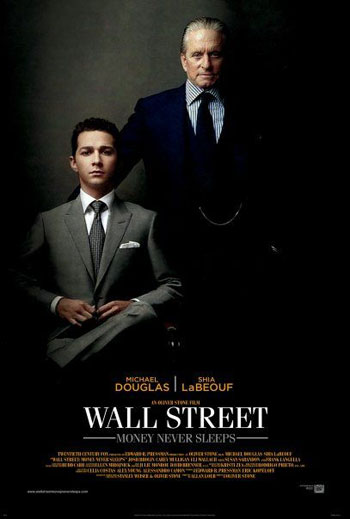Wall Street: Money Never Sleeps – 3*
 Wall Street, watch out: The Gekko is back, wiser, craggier-looking and more lethal, but with a soft spot that will always be his Achilles Heel. Wall Street creator Oliver Stone brings his anti-hero back to life and it’s thrilling to see the old dog sniffing around the green stuff again, whilst having an attack of the conscience and becoming more humane. That’s not to say the return of the 80s gambler, played by Michael Douglas, has lost his edge and isn’t up to his old tricks after prison – thankfully, far from it. He looks more determined than ever, with his stint in the can allowing him to home his ultimate revenge on his foes.
Wall Street, watch out: The Gekko is back, wiser, craggier-looking and more lethal, but with a soft spot that will always be his Achilles Heel. Wall Street creator Oliver Stone brings his anti-hero back to life and it’s thrilling to see the old dog sniffing around the green stuff again, whilst having an attack of the conscience and becoming more humane. That’s not to say the return of the 80s gambler, played by Michael Douglas, has lost his edge and isn’t up to his old tricks after prison – thankfully, far from it. He looks more determined than ever, with his stint in the can allowing him to home his ultimate revenge on his foes.
In fact Gekko is the single, most memorable and most exciting thing about this sequel. Apart from the lengthy boardroom wrangling and rapid-fire money jardon flying around that’s only of any real interest in its drawn-out form to those in the business or the know, try as hard as Stone might, the only scenes that really come alive are the ones with Douglas in them. The rest seem like ‘tension mounters’ for the latter, until ‘Gekko the villain’ creeps back on stage. Indeed the irony is this idol worshipping is part of the story, too, so the other characters must feel like Gekko ‘fluffers’, hanging on to his every move and waiting for their time to shine in his authority.
Nevertheless there are some solid performances from the likes of Shia LaBeouf, Josh Brolin and Carey Mulligan, but these are actually necessary to keep the stakes high and match the might of Douglas in one of his defining roles. LaBeouf plays young, smart and hungry very well as Gekko’s son-in-law-to-be and banking genius Jake Moore, but his puppy dog enthusiasm and wide-eyed surprise at being duped twice over starts to wear a little thin. Thank goodness for Brolin’s rogue banker character, Bretton James, who brings Jake down a peg or two, although James needed to be far nastier and more of a match for rival Gekko, to be honest, someone to really despised in villainous terms. This is sorely missing and could have magnified the on-screen electricity between the two old enemies, which we only get a taste of for a brief moment at a charity ball scene.
Mulligan playing Gekko’s estranged daughter results in the film’s more intriguing plotlines as Gekko uses her then realises he needs her to survive – and not for money’s sake. We actually get to see another side to Gekko that makes him a more rounded character, even if he still manages to keep us guessing as to his next move. That said the ending could be accused of being clichéd and slightly lazy. Tying up loose ends doesn’t always make for the most thrilling finale in such a film, even if it does go to appease us and put the world to rights.
Stone does what he does best and delivers a well-crafted and slick tale that adequately highlights the thrilling peaks and troughs of the global money market since the 80s, with the digital highway speeding money transfer and corruption along on its merry way. He has created a contemporary representation that does not seem too alien to reintroduce Gekko into. However, money may never sleep, but you would be forgiven for letting off a snore or two at some of the American-centric corporate scenarios, however valuable they might be in moving the narrative forward. Yes, greed is still bad – point taken. But Stone trying to introduce guilt about not thinking greener into the equation, using a ‘corporate banking selfishness’ storyline is both laughable and will fall on deaf ears. This film is about indulgence in the high life, which is the main reason to go and see it in the first place.
3/5 stars
By L G-K